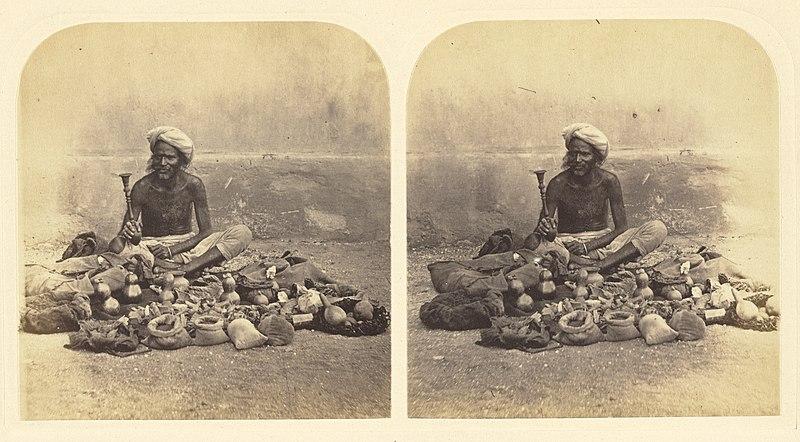Note: This article has been excerpted from a larger work in the public domain and shared here due to its historical value. It may contain outdated ideas and language that do not reflect TOTA’s opinions and beliefs.
From Life in an Indian Village by T. Ramakrishna, 1911.
Our village doctor knows nothing of surgery. He is a physician, pure and simple. He is a Virasiva by religion, and is said to have read a good many medical books. He is about fifty years of age, and enjoys a very good practice. He knows a little of astrology, but does not claim to know so much of it as Ramanuja Chariar, the Purohita. Like the Purohita and the schoolmaster, he is honoured and respected by the people of Kélambakam, and they have implicit confidence in his Skill and ability.
He carries with him all kinds of medicines in the shape of pills and powders. He is said to know the nature of a man’s complaint by feeling his pulse. He does not believe in the efficacy of medicine alone, but always takes care to impress upon the relatives of his patients the necessity of performing some religious ceremony or other to appease the anger of the gods. The simple villagers have so much faith in him that even if death takes away the patient, they attribute it not to any want of skill on his part, but to the stars that guided the patient’s destinies having been unfavourable.
Once Appasami Vathiar was absent from the village for a number of days, and Kothundarama Mudelly, the village munsiff, was at the time attacked with fever. It gradually grew worse, and the village munsiff’s relatives began to, entertain grave doubts about his recovery. News of this was sent to the vythian, who returned in haste to attend the patient. It was early in the morning when he entered the house of the village munsiff, and there in the Kutam or hall he saw the patient leaning upon his old mother and surrounded by a number of sorrowing relatives and friends.
The Purohita was seated in one part of the hall with some villagers looking at the sick man’s horoscope, making calculations and finding whether the malady would prove fatal. But the scene was changed the moment the vythian entered the house and sat by the sick man. The face of the old mother, down whose wrinkled cheeks tears were flowing in abundance, now beamed with joy, and the relatives who a minute ago were filled with despair were now animated with hope.
They whispered to one another that Kothundarama Mudelly’s recovery was beyond all doubt. So sudden and complete was the transformation. The vythian then felt the pulse of the sick man and quoted some verses from the Vagadam describing the malady, to which the mother nodded her head and said that the symptoms of the disease therein enumerated were noticed in her sick son.
Then said the vythian; “The malady has assumed serious proportions. Yama is fast overtaking the sick person. Here is the medicine Mrityunjayam (conqueror of death) which will put a stop to his deadly course. This medicine which my great grandfather prepared with the assistance of a rich zemindar must be continued for three days, and after that time the patient must take another medicine Jivarakshamritham (the ambrosia that saves life), which I prepared last year after consulting many shastras, spending about five cartloads of fuel, fasting for forty days, and feeding one hundred mendicants. The patient will gradually recover. But at the same time I must ask you to light ten lamps in the temple every day and feed six Brahmins till such time as the patient recovers.”
So saying he took from his medicine pouch two pills, mixed them in honey, and administered the same to the, patient. Then after giving instructions with regard to diet, &c., patiently answering the thousand and one anxious questions put to him by the relatives of the patient, and restoring confidence in them, and after promising to return in the evening, he departed. In ten days’ time the patient recovered, and this incident raised the vythian all the more in the estimation of the people of Kélambakam. Such is a short account of the village doctor, Appasami Vathiar, in whose skill the simple people of the village had the greatest confidence and for whose integrity and high character they had the highest respect.
Ramakrishna, T. Life in an Indian Village. T. Fisher Unwin, 1911.
About TOTA
TOTA.world provides cultural information and sharing across the world to help you explore your Family’s Cultural History and create deep connections with the lives and cultures of your ancestors.


